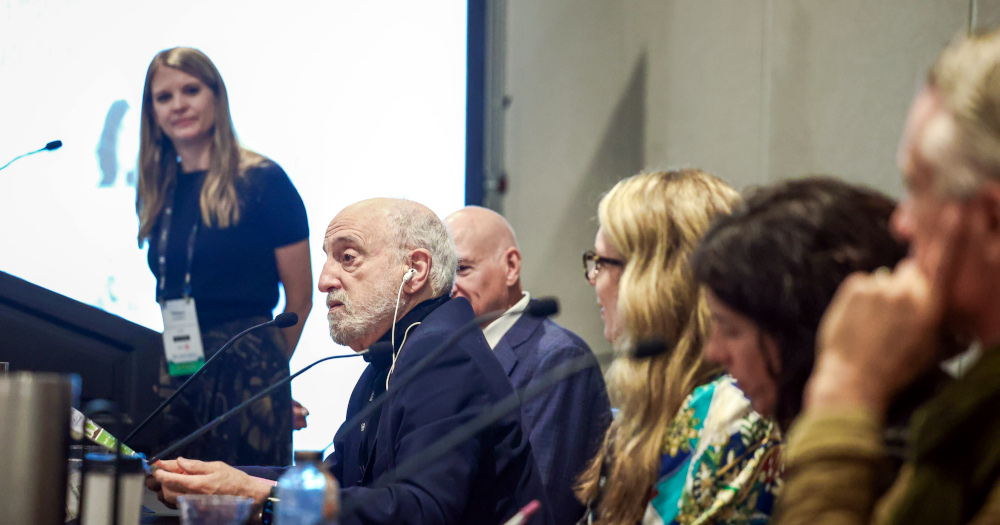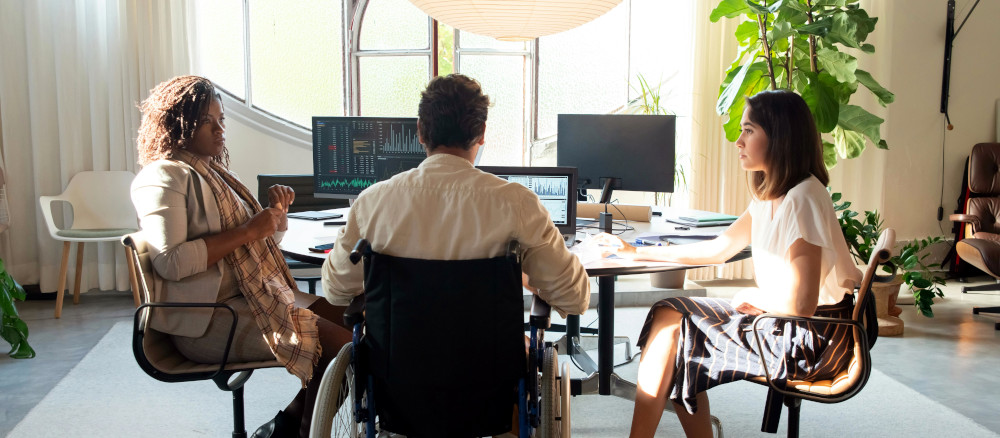Embed sustainability into company culture by finding what matters most to people
 L-R: Philippa Lockwood, Kevin Hagen, Gil Friend, Catherine
Musulin, Bea Boccalandro & Simon Mainwaring | Image credit: Sustainable Brands
L-R: Philippa Lockwood, Kevin Hagen, Gil Friend, Catherine
Musulin, Bea Boccalandro & Simon Mainwaring | Image credit: Sustainable Brands
“How can we embed sustainability into our workplace culture, and make it an
everyday activity for everybody?”
“How do we get buy-in from to- level executives for our sustainability
efforts?”
“What about succession planning? How do I get people to care about
sustainability if I leave?”
These were some of the questions on delegates’ minds during one of the opening
workshops at SB’24 San
Diego.
Moderated by Philippa
Lockwood, Manager of
Sustainable Ingredients at Mondelez
International, the session promised to
explore how brands can intentionally ‘cultivate’ sustainability advocates and
champions within all layers of an organization.
Among the panelists hoping to provide some answers (or at least guidance), Gil
Friend — CEO of the consultancy, Natural
Logic — helped to give the session some
context.
“Sustainability is not about doing less damage to the planet. It’s not about
doing a little bit better while maximizing returns for shareholders either,” he
said. For him, brands should think of sustainability as the act of doing
business “as if the organization belonged to the living world.”
Armed with a long list of compelling findings from her book, Do Good at
Work,
Bea Boccalandro urged brand
leaders in the audience to be unapologetic in their efforts to engage colleagues
on ESG issues. The business case for involving employees in subjects including
biodiversity
and human
rights
is so strong that sustainability professionals no longer need permission, she
said: “You are giving business value.”
Her research points to clear upticks in health, happiness and performance by
giving people purpose and meaning to their work: “It’s not just young people
that want meaningful work. Nearly all employees are pining for purpose in what
they are doing. Too many people are lifeless and listless, shuffling their way
through the working day because they don’t have a purpose. The sustainability
profession can solve that; it’s like giving people a vitamin. But you only need
trace amounts of it to make a difference.”
So, how do you do that? The crowded tables of delegates were thirsty for
practical examples for turning employees — and senior executives, especially —
into sustainability advocates and champions. Crucially, addressing ESG issues
cannot be seen as an add-on.
“If people say they don’t have time for sustainability, it’s about trying to
understand the barriers — and identifying how sustainability can impact their
operations or business,” offered Catherine
Musulin, Head of Mission and
Sustainability at Horizon Organic. Often, the key is
avoiding the ‘S’ word, using terms such as ‘efficiency’ to activate people’s
passions. “We are Chief Translation Officers,” she added.
The secret sauce for
engagement
can be applied by simply being successful, offered Kevin
Hagen. The former sustainability
lead at Iron Mountain gave the example of what
he’d seen happen at Walmart under the leadership of former CEO Lee
Scott: “People being
noticed for their contribution towards sustainability projects were being
promoted faster than other people. And that’s because those people were creating
more value for the business, not because they were 'green.'”
Meanwhile, We First’s Simon
Mainwaring said if sustainability
folk want to bring colleagues along with them, “you have to meet people where
they are.” And when it comes to convincing leadership to take ESG issues
seriously, yes — it’s about building a business
case and assessing the
competitive landscape. But more important than that, it’s about calculating and
communicating the cost of not acting.
“That’s when they freak out. It’s fun to scare people in leadership positions,”
he said, acknowledging the power of climate-modeling software such as Nvidia’s
Earth 2 in
showing executives just how bad the future might get.
The panelists agreed that the sustainability profession faces an uphill battle
in turning colleagues into sustainability champions. “Instead of asking the CSO,
‘what have you done for me lately,’ the power lies in making sustainability
everybody’s
responsibility,”
Mainwaring added. “In sharing the burden, you can build more resilience in the
business.”
Friend wrapped up the session with some warm words of encouragement.
“Communication is not just about what we say, it’s about listening to what
people care about and finding out what motivates them,” he added. “Despite our
apparent differences and the things we argue about, most people care about the
same things but speak about them in different ways.”
Check out more highlights from throughout the week at SB’24 San Diego!
‘Where DEI lives in a business determines whether it will live’
 Image credit: Kampus Production
Image credit: Kampus Production
The notion that Diversity, Equity and
Inclusion
(DEI) and sustainability share a common goal — creating long-term value for
society — forged its path through all the conversations, comments and questions
heard during a dedicated Wednesday afternoon session on the subject. By
fostering a diverse and inclusive workplace, companies are likely to not only
financially outperform their
peers
— they’re better equipped to address complex challenges by developing more
comprehensive and impactful sustainability strategies.
A clinical professor in Organizational Leadership for the Bard MBA in
Sustainability, Renay
Loper’s personal definition of
sustainability is clear: “It is shared wellbeing on a healthy planet. Justice,
equity, diversity and inclusion,” she said in opening the session as moderator.
The panel were asked to explain where DEI sits — or should sit — in
organizations in 2024. Khalilah “KO”
Olokunola, founder and Impact
Architect at ReEngineering HR, made a point that
resonated with the audience: “Where DEI lives determines whether it will always
live.” It needs to be the responsibility of somebody full time, she added — not
in human resources (“that’s about recruiting”): “If nobody’s responsible for it,
it’s nobody’s responsibility and it won’t survive.”
Francis Janes, Industry Relations
and Partnerships Director at Beneficial State
Foundation, concurred — saying that where DEI was
embedded in HR functions, there wasn’t as much integration of DEI considerations
with the sustainability team. And for Nani
Vishwanath — who heads up
Racial Equity, Diversity and Inclusion Innovation at outdoor apparel brand
REI — DEI teams are crucial in challenging industries
and the status quo, inside and out: “Traditionally, it was white, able-bodied men who spent time
outside. But people from all backgrounds have a relationship with nature, and we
are trying to bridge that
gap
and change that narrative.”
Asked to elaborate on the ‘how,’ Vishwanath described REI’s approach to
inclusive design. She calls it the ‘cut curb effect,’ whereby designers created
drop-away curbs to improve wheelchair access — a move that also benefits people
using strollers and wheeling luggage. The company developed an entry-level
backpack that helps customers overcome several barriers and recently introduced
its first non-gendered apparel
collection,
acknowledging that customers have a “mosaic of identities.”
“We listened. We improved affordability, we changed the colors — people were
saying ‘less beige, please; I want to look like myself out on the trail.’ Sizing
matters, too,” she said
These changes are being made as a result of listening to customers — but also by
working with partners, including Latino Outdoors
and Unlikely Hikers, she added. Now, the company
has set out a series of product impact standards for its more than 1,400
suppliers on DEI. For example, they no longer procure safety helmets that do not
consider different hair types — including coarse braids, for example — that
might not fit into a standard helmet. “We’ve given our suppliers guidance. But
we are not saying we are perfect; we certainly have room to grow.”
As the session wound down, the conversation circled back to KO’s earlier point
about the importance of “where DEI lives:” In the small meeting room, alongside
the positivity around DEI becoming a more mainstream concern for corporates,
several delegates (and panelists) shared their disgruntlement that DEI issues
aren’t given a bigger platform at events such as Sustainable Brands®. Accomplis
Collective founder Kelly
Beck agreed — saying that it was time for some
good, old-fashioned honesty: “We stole land from Indigenous Peoples. Then, we
exploited the land with stolen people. That’s why this work [DEI] is hard. We
should be on the main stage, not in small rooms.”
Get the latest insights, trends, and innovations to help position yourself at the forefront of sustainable business leadership—delivered straight to your inbox.
Sustainable Brands Staff
Published Oct 21, 2024 2pm EDT / 11am PDT / 7pm BST / 8pm CEST